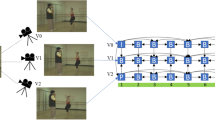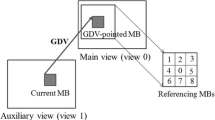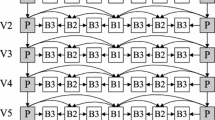Abstract
Disparity estimation can be used to eliminate redundancy among different views in multi-view video compression to obtain high compression efficiency. However, the problem of high computational complexity in disparity estimation, which limits real-time applications of multi-view systems, needs to be solved. In this paper, a novel fast multi-view disparity estimation algorithm based on Hadamard similarity coefficient for multi-view video coding is proposed by using prediction of initial search point, selection of reference view, determination of the best disparity vector, and strategies of search stop. Experimental results show that the proposed algorithm can significantly reduce the computational complexity in multi-view disparity estimation.
Preview
Unable to display preview. Download preview PDF.
Similar content being viewed by others
References
ISO/IEC JTC1/SC29/WG11 N5877: Application and Requirements for 3DAV. Trondheim (2003)
Jiang, G., Shao, F., Yu, M., et al.: Efficient Block Matching for Ray-Space Predictive Coding in Free-Viewpoint Television Systems. In: Gavrilova, M.L., Gervasi, O., Kumar, V., Tan, C.J.K., Taniar, D., Laganá, A., Mun, Y., Choo, H. (eds.) ICCSA 2006. LNCS, vol. 3980, pp. 307–316. Springer, Heidelberg (2006)
Jiang, G., Fan, L., Yu, M., et al.: Fast ray-space interpolation based on occlusion analysis and feature points detection. In: Hao, Y., Liu, J., Wang, Y.-P., Cheung, Y.-m., Yin, H., Jiao, L., Ma, J., Jiao, Y.-C. (eds.) CIS 2005. LNCS (LNAI), vol. 3802, pp. 935–940. Springer, Heidelberg (2005)
ISO/IEC JTC 1/SC 29/WG 11N7328: Introduction to Multi-view Video Coding, Poznan, Poland (2005)
Grammalidis, N., Strintzis, M.: Disparity and occlusion estimation in multi-ocular systems and their coding for the communication of multi-view image sequences. IEEE Trans. on CSVT, 328–344 (1998)
Kimata, H., Kitahara, M., Kamikura, K., et al.: Multi-view video coding using reference picture selection for free viewpoint video communication. In: Proc. of Picture Coding Symposium, pp. 499–502 (2004)
Lopez, J., Kim, J.: Block-based illumination compensation and search techniques for multi-view video coding. In: Proc. of Picture Coding Symposium, pp. 509–514 (2004)
Woo, W., Ortoga, A.: Stereo images compression with disparity compensation using the MRF mode. In: Proc. of the SPIE, vol. 2727, pp. 28–39 (1998)
Author information
Authors and Affiliations
Editor information
Editors and Affiliations
Rights and permissions
Copyright information
© 2006 Springer-Verlag Berlin Heidelberg
About this paper
Cite this paper
Jiang, G., Yu, M., Shao, F., Yang, Y., Dong, H. (2006). Fast Multi-view Disparity Estimation for Multi-view Video Systems. In: Blanc-Talon, J., Philips, W., Popescu, D., Scheunders, P. (eds) Advanced Concepts for Intelligent Vision Systems. ACIVS 2006. Lecture Notes in Computer Science, vol 4179. Springer, Berlin, Heidelberg. https://doi.org/10.1007/11864349_45
Download citation
DOI: https://doi.org/10.1007/11864349_45
Publisher Name: Springer, Berlin, Heidelberg
Print ISBN: 978-3-540-44630-9
Online ISBN: 978-3-540-44632-3
eBook Packages: Computer ScienceComputer Science (R0)




